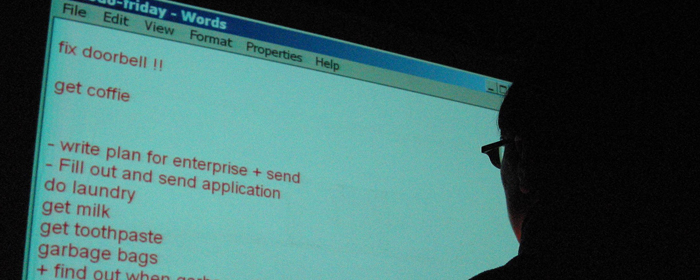 |
Or Press Escape"When the first team of morons started approaching rhythmically from the sidelines, I clicked Retry. They marched on. Cancel didn’t work either. As last resort, there was still OK. I hesitated." Select all. Cut. Or Press Escape is a solo piece for theatre in which the narrative is constructed in the forms that everyday computer-use offers, and displayed on a large projection of the computer screen. The performer sits with the keyboards in front of the screen formulating her thoughts in writing, altering the text, surfing, chatting, receiving e-mails, opening images, playing movie and sound files. Other elements of the computer, such the names and arrangements of files and folders, the appearance of icons, of the desktop, the history of the visited internet sites are also used for their communicative value to contribute to the narrative line. A woman is sitting behind her computer somewhere in Western Europe. She is clearly a stranger in her new environment, isolated and invisible. Indications of her past life pop up in e-mails, pictures on the desktop, people in the description of a dream, and suggest a contrast to the vacuum of her here and now. Her thoughts are dominated by angst and the desire to break out of her isolation. Her attention is split. On the one hand she has to compile a dossier of herself, of her plans, that can seem convincing enough for the authorities to fulfil the requirements for a residency status in the new country. At the same time, she is continually distracted by an anxiety-ridden longing for personal contact. She tries to write to her neighbours, introducing herself, but her struggle with the language and the nature of the situation deems her attempts inappropriate, awkward and absurd. Gradually, the focus of all her desires, fears and frustrations shift to the person she believes to be living illegally in the attic above her. During the writing, altering, deleting and rewriting of a letter to him, we follow how she builds up and goes through various stages of an increasingly intimate one-to-one relationship, leading in the direction of stronger and stronger identification with the person she’s addressing. As the immobility, the absence of ‘the other’ becomes unbearable, she snaps, and catapults herself into a complete vacuum. Or Press Escape premiered in 2002 and had toured for years widely in Europe and beyond. From the Press: “Edit Kaldor’s ‘desktop theatre’ becomes a refined and dramaturgically effective theatre performance, as well as the highpoint of the (Plateaux) festival. Not only does an entertaining and intelligent story emerge on the large projection of the screen, but at the same time, also a fascinatingly strong presence of the performer.” (Frankfurter Rundschau) "Or Press Escape uses humour and new technology to develop a touching and complex portrait of solitude. A daring performance, based on a paradoxical presence on the scene. It is an astounding confrontation with one's own isolation.” (Liberation) "A brilliant reflection on our relationship with new media, especially with personal computers. (De Financieel-Economische Tijd) "The projection screen becomes a poignant mirror of [Kaldor's] own phantasmagoric realm of thoughts. Or Press Escape is already a classic.” (De Morgen) |
CREDITS
concept and text: Edit Kaldor
performed by Edit Kaldor with Cecilia Vallejos/ Zsolt Mesterhazy
made in collaboration with Nicola Unger, Zsolt Mesterhazy, Catherine Henegan
software: Marc Boon
co-produced by Theater Gasthuis, Amsterdam and Kuenstlerhaus Mousonturm, Frankfurt
developed with the support of wp Zimmer, Antwerp, DasArts, Amsterdam and Votnik, Brussels